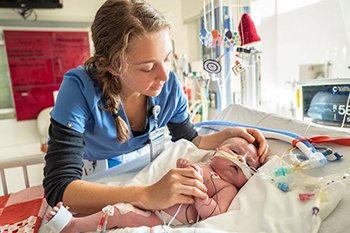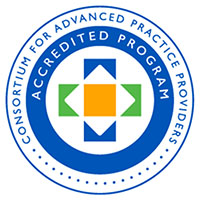New Graduate Neonatal Nurse Practitioner Fellowship
 Welcome to the Seattle Children’s New Graduate Neonatal Nurse Practitioner (New Grad NNP) Fellowship! Our mission is to provide board certified new graduate NNPs the post-Master's/Doctorate degree support, education, training, and skills they need to become successful and confident neonatal advanced practice providers. Our fellowship is a 12-month clinical and didactic training program with cohorts starting twice per year.
Welcome to the Seattle Children’s New Graduate Neonatal Nurse Practitioner (New Grad NNP) Fellowship! Our mission is to provide board certified new graduate NNPs the post-Master's/Doctorate degree support, education, training, and skills they need to become successful and confident neonatal advanced practice providers. Our fellowship is a 12-month clinical and didactic training program with cohorts starting twice per year.
-
Prerequisites
Prior to acceptance to the New Graduate NNP Fellowship, the new graduate NNP applicant must meet the following requirements:
- graduated from an accredited NNP educational program
- Master’s degree or Doctoral degree in Nursing
- NCC board certified
- licensed in WA state
-
Facilities
New Graduate NNP fellows will rotate through one level III community site in the Seattle Children's Hospital (SCH) regional neonatology program and the SCH level IV NICU. They will spend some time at each site with mentorship, then independent practice, before moving to a new site. This will help establish a solid foundation to become a competent neonatal advanced practice provider.
- Providence Regional Medical Center, Everett (Level III NICU)
- Joseph Medical Center, Tacoma (Level III NICU)
- Seattle Children’s Hospital, Seattle (Level IV NICU)
-
Curriculum
Onboarding and welome
The New Grad NNP will attend Seattle Children's Hospital onboarding activities and will be welcomed by the Neonatal APP leadership. Initial resources will be shared. An initial pre-program survey and competency self-assessment checklist will be sent to the New Grad NNP to identify areas of interest or need, as well as a gap analysis.
The New Graduate NNP fellows will receive either a virtual or in-person short Boot Camp to include some review of Fluid, Electrolyte, Nutrition concepts, ELBW management, and blood gas interpretation with ventilator management approaches with a focus on UW/SCH division guidelines. The NNP fellow will be scheduled to attend a Resuscitation Skills Day lab at some point during fellowship to focus on resuscitation and critical skills.
Clinical rotations
The New Grad NNP will rotate to Seattle Children’s level IV NICU and one level III community site over the 12-month period. New Grad NNP fellows will be paired with an experienced neonatal APP mentor with them who will guide them through expected clinical competencies during their orientation period at each clinical site. New grad NNP fellows begin with a small patient load and are expected to progress on patient load and acuity each week. By months 2-4 at each clinical site, the new grad NNP fellow will be taking an entire APP patient load daily with the mentor acting as a support person, providing minimal guidance as needed. After successful completion of mentored shifts at each site, the NNP fellow will spend the remainder of their fellowship year in independent practice as an APP at each site with experienced APPs and neonatologists always available for support and guidance. The NNP fellow will spend about 6 months in mentored shifts and 6 months in independent practice throughout their fellowship year.
New Grad NNP fellows spend 30-40 hours in clinical training each week on 12-hour shifts. The new grad NNP fellow will begin on day shift and will be expected to progress to a combination of day and night shifts by one month into their clinical training. Neonatal APP fellows are able to train to 24-hour shifts if desired.
Formal clinical evaluations are performed monthly for the entire 12-month fellowship by the APP fellowship supervisor.
Didactics
Neonatal NP fellows will attend twice-a-month didactic classes with the PA neonatal fellows. Didactics focuses on support of practical application of critical thinking through case-based review of neonatal problems. These topics include complex fluid and electrolyte management; blood gas interpretation and ventilator management; difficult conversations involving the new grad NNP fellow in the new role; and other complex cases.
The foundational theory is based upon “From Novice to Expert” (Benner, 1984). A case-based, systems approach is valued and participants are asked to present informal case-based topics as well as one formal case-based topic to their peers. The purpose of this is to educate others and reiterate the value placed on mentorship and teaching, by all, at this academic institution.
Classes are taught by an array of guest speakers including neonatologists, neonatal APPs, subspecialist guest speakers, dietitians, pharmacists, nurses, respiratory therapists, therapists (physical/occupational) and more. The goal for the guest speakers is to include content related to complex neonatal problems to build upon and complement the educational curriculum in the NNP academic programs.
The new grad NNP fellows will be provided with online resources, including a handbook with resources for each site. There will also be didactic assignments to support expected competencies. Didactic evaluations will occur at intervals throughout the fellowship to test critical-thinking skills. Fellows are required to attend all didactic classes and should plan time away around the scheduled didactic class dates.
Procedural skills
A gap analysis upon hiring will identify any specific procedural skill needs because of lack of opportunity during the NNP educational program. During clinical rotations, the New Grad NNP fellow will be mentored in and will become competent in the following procedures and more:
- Intubation
- Umbilical line placement
- Chest tube insertion
- Needle thoracentesis
- Lumbar puncture
- Peripheral arterial line placement
- Peripheral IV placement
-
Faculty Members
-
Current New Grad NNPs
We can arrange for you to speak with one of the current NNP Fellows. If you wish to do so, email [email protected] or [email protected].
-
How to Apply
New Graduate NNPs are welcome to apple at any time through our Careers page.
New Graduate NNP fellows are selected based upon assessed qualities of academic achievement; neonatal nursing experiences; desire for learning; previous professional activities and contributions; ability to work a flexible schedule at various clinical sites; and confidence.
For more information, please email Ben Davies at [email protected].
 Contact us
Contact us
Email
[email protected]
